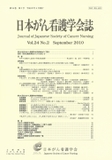Japanese
English
- 販売していません
- Abstract 文献概要
- 参考文献 Reference
- サイト内被引用 Cited by
要旨
本研究の目的は,若年子宮頸がん患者の手術決意過程を明らかにし,看護実践への示唆を得ることである.対象は,初発の子宮頸がんのために子宮頸部手術を受けた20歳以上30歳未満の女性9名で,退院後約6週間が経過した外来受診時に半構成的面接を行い質的帰納的に分析した.その結果,若年子宮頸がん患者の手術決意過程は,【一瞬の衝撃】に始まるが,『信じられる医師の存在』と【背中を押してくれる身内の存在】により【迷いのない手術決意】をし,それ以降『医師以外の情報の遮断』および【入院できる環境づくり】をして入院に至る過程であった.衝撃を一瞬のものにしたのは,【がんを取っても産めるという医師の太鼓判】と『出産への強い願い』であった.一方,【迷いのない手術決意】後【疑いの浮上】が起きる場合があった.その場合,【疑いを晴らす試み】をして疑いが解決すれば『詮索の中止』をする.『保身による質問の遠慮』をして疑いが解決できない場合であっても『詮索の中止』をして,【医師に従うしかないと手術決意】する場合もあった.また,この過程で『遊んでいる女という偏見への怯え』を抱え込む患者もいた.さらに,この手術決意過程にかかわる看護師の存在はきわめて希薄であった.看護師は,患者に迷いや疑問が生じた時,電話や電子メールによる相談にのることで,手術決意過程における人的資源となりうる存在であることを示していく必要があると示唆された.
Abstract
The purpose of this study was to obtain suggestions for improved nursing care by clarifying the decision-making process to undergo surgery in young women with cervical cancer. We conducted semi-structural interviews with a convenience sample of nine women between the ages of 21-29 with primary cervical cancer. Interviews occurred during their hospital follow-up visit about six weeks after surgery. Data were analyzed qualitatively by inductively forming themes.
We found that the decision-making process to have surgery among young women with cervical cancer began with the "shock of the moment", followed by their "resolute decision to have surgery" due to the "presence of a doctor whom they could trust" and the "encouragement of friends and relatives". Thereafter, leading up to their hospitalization, they would "block out information other than that from their doctor" and "prepare for hospitalization". What made their shock a momentary situation was "their desire to have children" and the "doctor's guarantee of being able to still have children after the removal of the cancer". However, in some cases, "post-decision doubts appeared". When this happened, they "tried to dispel their doubts", and once the doubts were resolved, they "refrained from making inquiries". Some women "protected themselves by refraining from making inquiries", despite "being uncertain", and "decided that they must comply with the doctor and have surgery". Others worried that this process would cause them to be "perceived as frivolous". Moreover, it was exceedingly rare for a nurse to be part of their decision-making process to have surgery. This suggests that it is important that nurses become a resource in the decision-making process and conduct telephone or e-mail discussions with patients when they have questions and are in doubt.
Copyright © 2010, Japanese Society of Cancer Nursing All rights reserved.


